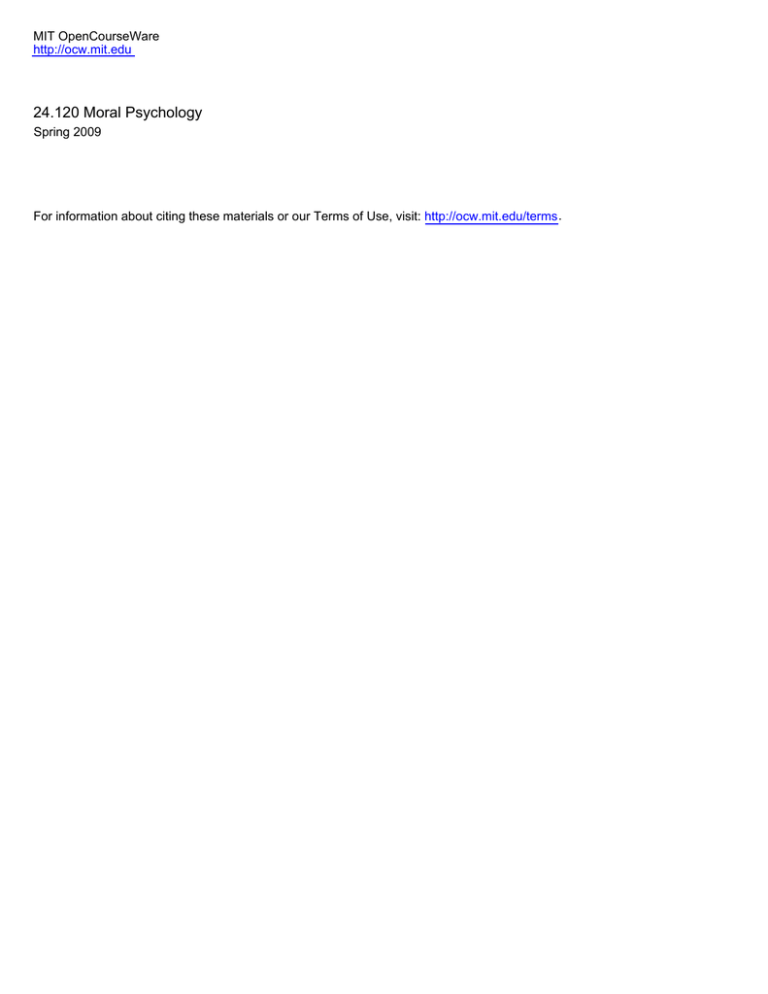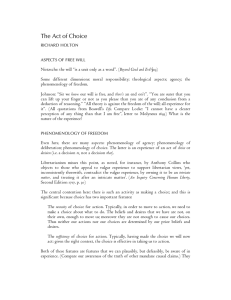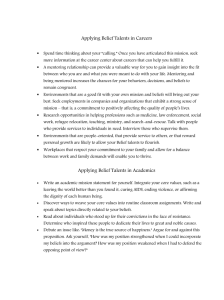24.120 Moral Psychology
advertisement

MIT OpenCourseWare http://ocw.mit.edu 24.120 Moral Psychology Spring 2009 For information about citing these materials or our Terms of Use, visit: http://ocw.mit.edu/terms. 24.120 MORAL PSYCHOLOGY RICHARD HOLTON XVII Free Will V: Choice ASPECTS OF FREE WILL Nietzsche: the will “is a unit only as a word”. (Beyond Good and Evil §19) Some different dimensions: moral; theological; agential; phenomenological. Much of the intuitive pressure for free will comes from the phenomenology. Johnson: “Sir we know our will is free, and there’s an end on’t”. “You are surer that you can lift up your finger or not as you please than you are of any conclusion from a deduction of reasoning.” “All theory is against the freedom of the will; all experience for it”. (All quotations from Boswell’s Life. Compare Locke: “I cannot have a clearer perception of any thing than that I am free”, letter to Molyneux 1693) Libertarianism misses this point, as noted, for instance, by Anthony Collins who objects to those who appeal to vulgar experience to support libertarian views, “yet, inconsistently therewith, contradict the vulgar experience, by owning it to be an intricate matter, and treating it after an intricate matter.” (An Inquiry Concerning Human Liberty, Second Edition 1717, p. 30) THE PHENOMENOLOGY OF FREEDOM What is the nature of the experience? Even here, many aspects: phenomenology of agency (absent in anarchic hand syndrome); phenomenology of deliberation; phenomenology of choice. The concern here is with the last of these. This is an experience of an act of choice or decision (i.e. a decision to, not a decision that). Central contention: there is an activity of making a choice; it happens when the question of what to do arises (for many actions it never does: dual process model); it is significant because of: The necessity of choice for certain actions. Once the question of what to do has arisen, in order to move to action we need to make a choice about what to do. The beliefs and desires that we have are not, on their own, enough. Moreover they are not enough to cause our choices. Thus neither our actions nor our choices are determined by our prior beliefs and desires. The sufficiency of choice for certain actions. Standardly, having made the choice we will now act: given the right context, the choice is effective in taking us to action. Both of these are features that we can defeasibly be aware of in experience. They are, however, compatible with determinism. They are only incompatible with a particular way in which our actions might be determined, i.e. by beliefs and desires. (For some reason most compatibilists seem to have given themselves the job of analysing freedom in terms of beliefs and desires. This is mistaken twice over; firstly, in trying to give an analysis at all; secondly in trying to do it in terms of beliefs and desires.) Challenges to necessity: automatic actions, either habitual or instinctive, performed in the absence of choice. But here normally the question of what to do has not arisen. Challenges to sufficiency: automatic actions overruling choice. Both are plausibly understood as local challenges, i.e. as challenges to a claim that a particular action resulted from a choice. Neither suggests that choice is always merely epiphenomenal (pace Wegner). Different actions have different kinds of aetiology. STANDARD COMPATIBILIST ACCOUNTS Standard compatibilist accounts typically don’t make space for an act of choice; and it is hard to see how they could. Desire based accounts The objects, means, &c are the weights, the man is the scale, the understanding of a convenience or inconvenience is the pressure of those weights, which incline him now one way, now another; and that inclination is the will. (Hobbes, Collected English Works Vol. V p. 326.) Belief (or reason) based accounts (i) deliberation: considering the options that are available, and their likely consequences; getting clear on one’s own desires, and one’s own prior plans and intentions; seeing how the options fit in with these desires and plans; establishing pros and cons. (ii) deciding that: making a judgment that a certain action is best, given the considerations raised in the process of deliberation. The upshot of the judgment is a belief. (iii) deciding to: deciding to do the action that one judged was best. The upshot of this decision is an intention. (iv) acting: acting on the intention that has been made, which involves both doing that thing, and coordinating other actions and intentions around it. On internalist accounts, (iii) collapses into (ii); but then there no real place for choice. On externalist accounts the two remain distinct, but then choice becomes a liability. Indeed, this isn’t just a problem for standard belief based compatibilist accounts; it is a problem for anyone who advocates a substantial role for choice to explain why we might need and value it. EXPLAINING THE NEED FOR CHOICE (1) Theological considerations: the need for a test etc. Tricky with God, hopeless without Him. (2) The utility of intentions — 2 — Agents with intentions do better. But this doesn’t explain the need for choice. There is more to choice than the formation of intention. Why not simply automatically form one’s intentions on the basis of one’s beliefs and desires? (3) Indifference and incommensurability Yes, but this risks making choosing look like picking. (4) Acting on limited information Maximizing is very difficult and so very cognitively expensive; we are typically unable to do it. So we do not arrive at stage (ii). Situations of perceived incommensurability can be understood as involving an inability to rank, not necessarily as involving the (philosophically tendentious) conviction that there is no ranking available. We are very frequently in the position that several options look good, and that whilst we think that one might be the best, we are unable to form a judgment, in the time available, about which one it is. If we have little idea about how to go about ranking them, that is a situation that we would think of as possibly involving incommensurability; if we know how to rank but lack the time to do so, that is simple lack of information. Both of these are situations in which the ability to choose is needed. But choosing here does not amount to mere picking. The agent deliberates in deciding what to do; it is just that this deliberation does not involve arriving at judgments as to what is best, but at choices about what to do. (Compare Anscombe on the upshot of practical deliberation.) THREE OBJECTIONS (i) If you can’t get an objective ranking, go for a subjective ranking. Response: this misunderstands the force of the worry: it is exactly the subjective ranking that is unavailable. (ii) On satisficing accounts, the action is determined by the belief that a certain outcome is good enough. Response: the belief that an option is good enough merely makes it eligible for choice; it isn’t the reason for choosing it. And in many cases there will be more than one option that is eligible. (iii) If choice is itself an act, then we must in turn choose whether to choose, and then in turn choose that, which brings a regress. Response: deny that every act involves choice. Some (e.g. automatic acts) don’t. Acts of choice typically aren’t themselves acts that we choose to perform (though they can be). No regress gets going. JUDGEMENT AS SUBSEQUENT TO CHOICE (OR SIMULTANEOUS WITH IT) The argument so far: choice to perform a certain act frequently does not follow from a judgment that that act is best. A further claim: even when that judgment exists, it frequently follows the choice. Nisbett and Wilson’s right bias experiments: subjects came to judge that the right-most of a set of identical objects was the best. But did the subjects have a brute tendency to judge the right­ — 3 — most best? Or did they rather have a brute tendency to choose the right-most, and they then inferred that it must be best on the basis of their choice? The latter explanation seems more plausible. (Nisbett and Wilson speak of choice, rather than decision, throughout their discussion, as do most of the subsequent commentators.) It’s easy to think that such judgements are just rationalizations; that is the approach that has dominated cognitive dissonance theory. Alternatively it might be held that they provide a path to self-knowledge: that agents come to discover something about themselves as a result of looking at their own choices (see Daryl Bem). Note that this isn’t just behaviorism: there is no hostility here to mental states and acts. On Bem’s view one can gain self-knowledge by looking at one’s choices even if one hasn’t yet done anything. Perhaps they bring not just self-knowledge, but knowledge about the world. How? Much of the more picturesque psychology literature focuses on cases (like the right bias case) of inappropriate triggers. But many cases are not like this. Competent actors very often gain abilities to make good choices without having any insight into what they are doing. For instance, in the laboratory, Lewicki et al. on the quadrant game, Bechara et al. on the gambling game; in the real world, Klein on fire-fighters, neo-natal nurses, missile operators. Whether such cases provide knowledge depends (at least) on the reliability of the processes involved. It could be random; it could be not. The agent doesn’t know which. It is not picking; it is choosing. We merely pick when we know that we are using a random (or effectively random) process. Sometimes when we choose the process will be random, but very often it will not; and we don’t know which. Does this provide evidence that choice can precede judgment about what is best? Two worries: (1) Don’t these cases just show that agents can have prior unconscious beliefs about what is best? And so can’t we revert to the model in which choice is determined by belief. (2) Even if agents don’t have prior unconscious beliefs about what is best, shouldn’t these cases be understood as showing that there are various ways that agents can generate such beliefs before choosing what to do? Answers in order: (1) There are cases and cases: (i) the agent does indeed have a prior unconscious belief that a certain option is best. (ii) the agent has a prior unconscious belief that there is something good about a certain option, but until they choose what to do, this belief is insufficiently integrated with their other beliefs to amount to a belief that this option is best. (iii) the agent has an unconscious disposition in favor of a certain option, but until they choose what to do, this disposition is insufficiently integrated with their other beliefs to amount to a belief at all. — 4 — How many fall under (i)? Judging an option best involves comparing it with other options. Do unconscious beliefs have sufficient integration with other (conscious and unconscious) beliefs for this? Some will surely fall under (iii); I’m not too concerned with how to draw the line between (ii) and (iii). But even if they all fell under (i), the knowledge of this would not be available to the agent. The agent would not know whether they were choosing randomly or not. (2) Again, there are cases and cases. Retreat from the claim that choice strictly precedes judgment. More likely story: a choice appeals, agent imagines acting on it, changes judgement, which reinforces (or undermines) the original choice, which further changes judgement, and so on. Thus interaction between choices and judgments. It might be vague exactly when a choice is made and the resulting intention formed. The point is that beliefs about what is best frequently don’t precede choice. As well as this interaction between beliefs and choices, there is interaction between our conscious states and our unconscious ones: unconscious considerations may give rise to a conscious choice, which will give rise to further unconscious reactions (e.g. emotional reactions), which will affect conscious beliefs. CLARIFICATIONS Question: Is it only in cases where we lack knowledge of what is best that we make a choice? Answer: No. The idea is that we have the capacity to choose because we frequently lack knowledge. But the capacity can function in all cases, whether there is such a lack or not; or at least, all cases where there is nothing stopping it. That is part of the explanation of how akrasia is possible: we can choose even when we do have a firm belief about what is best (and maybe sometimes an akratic choice will be for the best, c.f. Arpaly). There are indeed cases where choice does not function: when behaviour is automatic or habitual. But even here we can often take our behaviour out of the range of the automatic or habitual. Question: Does the account effectively make the old and disreputable move of identifying freedom with ignorance? Answer: It is true that the account does suggest that if we always knew which option was best, then we would have no need for the capacity to choose. But the phenomenology of choice is not simply an illusion engendered by our ignorance; it is not that, due to our ignorance, we mistakenly believe that we have choice. Choice is a real process, made necessary by our ignorance. (It is perhaps true that if we knew what we were going to do—if we had the Book of Life—we would not experience choice as we experience it now; but if we knew what we were going to do our phenomenology would be very different altogether. Indeed, there are other places in which a certain kind of ignorance is a prerequisite for knowledge: compare Lewis on the two Gods. In general our life would be unimaginably different if we were not limited in the many ways we are.) Question: Does the resulting notion of choice have a special moral importance? Answer: I doubt it. — 5 —






